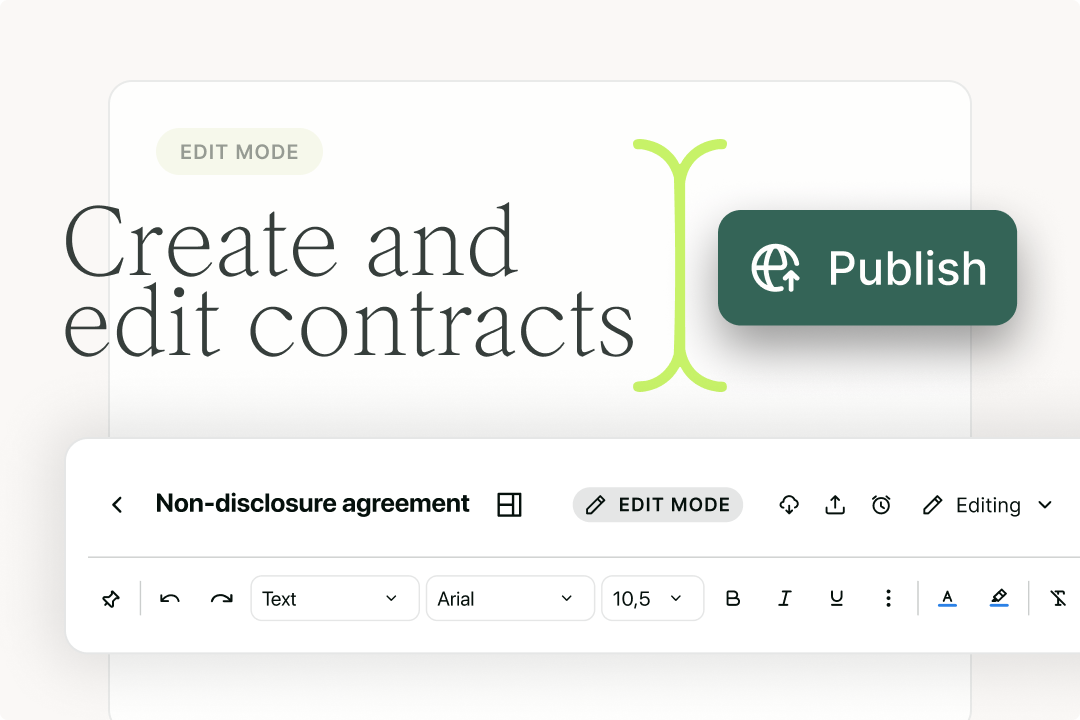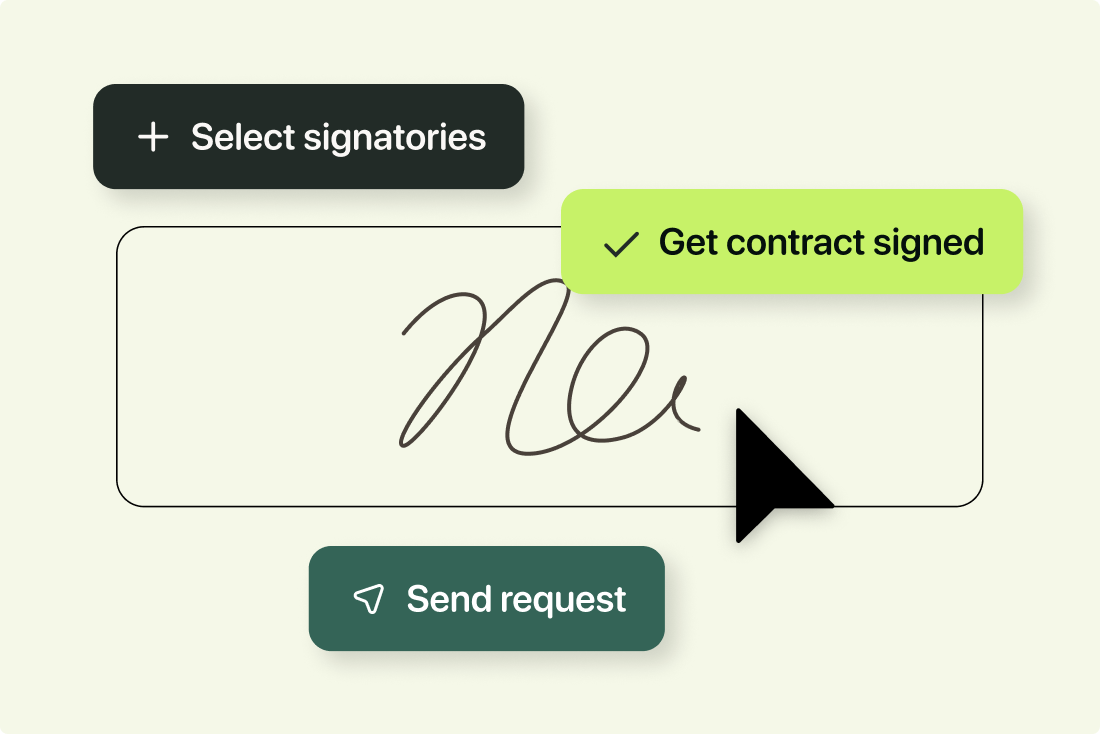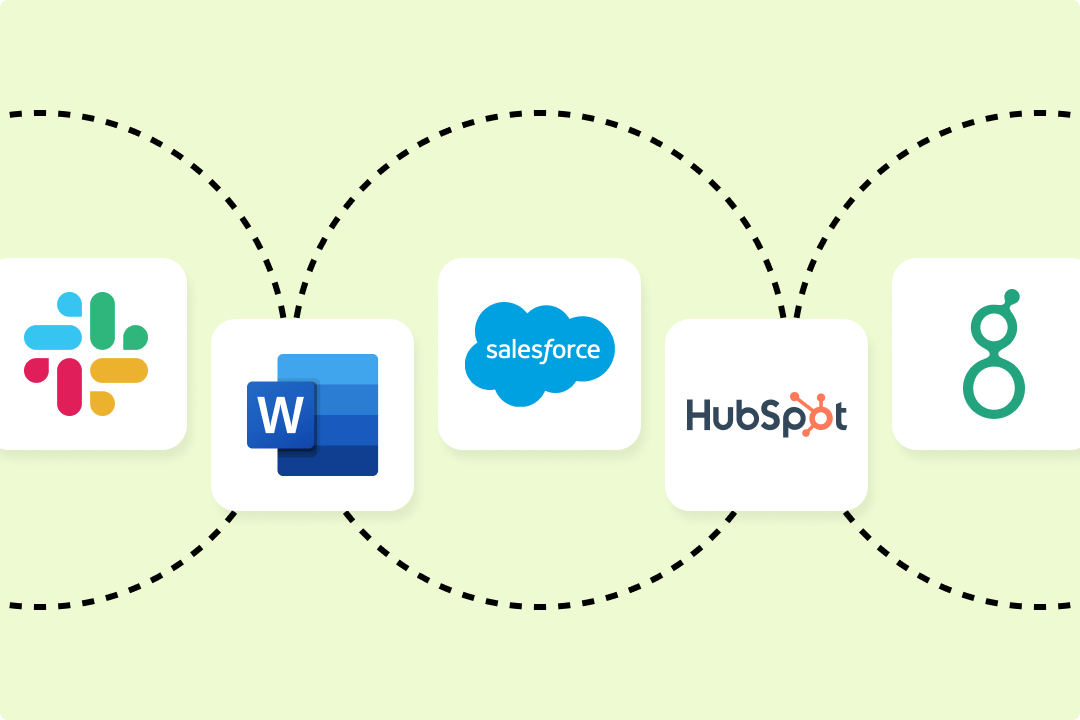Solutions
Customer Support
Resources
With higher contract volumes, greater risk, and more stakeholders involved, large organizations need tools and processes that deliver control without slowing the business down. This guide breaks down what enterprise teams should prioritize when evaluating CLM in 2026.
Enterprise contract management describes the process large organizations use to handle their contracts, from creation all the way through to signature and execution.
It involves the typical stages of the contract lifecycle, but with added complexity due to the high value, volumes and risks with enterprise contracts.
Due to the scale of their operations, enterprise businesses manage a lot of contracts. They hire a lot more people. They work with more vendors. They close higher value deals.
This means that their contract management processes can have a sizeable impact on other business objectives. There’s a significant upside for enterprise companies that manage their contracts more effectively. There’s also a lot of risk involved for those that don’t.
Enterprise contract lifecycle management solutions provide the functionality businesses need to streamline their contract workflows.
Rather than relying on a combination of different tools and fragmented processes, businesses with an enterprise CLM platform can regain control over their contracts and automate work that’s otherwise completed manually.

The right enterprise contract management solution can benefit businesses in the following ways:
However, it’s important to recognize that these benefits are only possible when businesses choose the right contract lifecycle management solution for them.
Fortunately, there are plenty of resources to help enterprise companies evaluate their options, including the ones below:
Features should also be a focal point for enterprise companies when evaluating contract management tools. Let’s run through some of the most important features for larger organizations in 2026.
Access to unlimited contract templates is a core feature for enterprise businesses that manage contracts at scale. Without them, large corporations will need to pay per template, or worse, will be blocked by limited templates. Given how many contracts enterprise companies process on average, this quickly becomes expensive.

Conditional logic is another useful feature for enterprise legal and business teams since it enables commercial teams to self-serve on contract creation at scale, without inviting contractual risk.
Conditional logic allows businesses to set rules and bake fallback positions into contract templates, enabling legal teams to retain control over the terms drafting and reiviewing them individually.
As we just mentioned, legal teams in enterprise stage companies won’t have the capacity to review every contract that lands on their desk. They need to optimize their contract process. Conditional approvers enables businesses to ensure that only the contracts that require legal approval are pushed to legal, unblocking those that don’t in turn.
This works by automating when certain contracts require approval from certain individuals, based on the terms or value of a contract.

Simple and secure sign-on is also important for enterprise contract management since many large organizations will operate with multiple business systems and lots of employees. Single sign-on enables users to sign in using quickly and securely using one set of credentials to streamline the process.
Want to find out more about what enterprise-grade security looks like? Check out these articles on compliance, security and privacy.
Trust is critical for enterprise businesses that manage larger transactions and customers. Custom branding is a fantastic way for large companies to build and maintain this trust.
Within Juro, for example, users can update the text used within transactional emails, as well as insert company logos and colours to increase trust and engagement from counterparties.
Although most contracts won’t require a specific type of electronic signature, offering a more secure way to sign can be a dealbreaker for some large enterprises. That’s why it’s a good idea to choose a contract management software that offers or integrates with an advanced eSigning solution.

Other useful enterprise contract management features for the signing phase include identity verification, audit trails of key actions and immutable document records, all of which help to ensure compliance.
The more contracts you create, the harder it is to track upcoming contract deadlines. This means that monitoring contract renewals as a large business can quickly become chaotic without the right safeguards in place.
Renewal reminders are a fantastic way to improve this process, as it enables key contract stakeholders to manage contract renewals at scale and minimize contract value leakage.
Bulk actions empower legal and business users to manage the creation, sending and signing of contracts at scale, making large contract volumes more manageable for enterprise businesses.
This enterprise contract lifecycle management functionality is particularly useful for HR departments in large organizations that need to issue employment documents, like salary increase letters or option agreements, at scale. It’s also a great way to streamline onboarding document creation for large groups of new hires.
Enterprise users will typically move between different business platforms within their roles, so it makes sense to integrate these with their contract tool. When selecting an enterprise contract management system, it’s worth seeking one that’s compatible with core business systems, like Salesforce, HubSpot, Workday and Greenhouse.

To find out more, check out this guide to enterprise CLM integrations in 2026.
Along with the features we just discussed, it’s important to consider the following factors when choosing an enterprise contract management platform.
An extensive feature set is only as good as your ability to use them. That’s why it’s important to balance functionality with ease of use when choosing an enterprise CLM solution.
Certain legacy CLM solutions are renowned for offering a lot of complex features. However, independent reviews on G2 often express frustration from customers that find these features difficult to access or amend without the vendor’s support.
This is because the features are too complex and lack the flexibility required for users to self-serve on important tasks like editing a workflow or contract template.
By contrast, Juro is rated above the industry average for ease of use on G2, with a score of 9.1 out of 10. In fact, Juro is frequently praised for its user-friendly interface and flexible workflows.
{{quote1}}
To find out more about how enterprise businesses can benefit from Juro, hit the button below hear from a contract specialist. Otherwise, read on.
Cost is an important consideration for businesses evaluating enterprise contract management software in 2026, with some solutions costing significantly more than others.
CLM vendors that charge businesses per user can be particularly punitive for large or growing businesses, especially if certain users won’t be using the CLM solution as frequently as others. This is because enterprise businesses tend to have the greatest number of users and need to collaborate most often.
Instead, it’s more affordable for enterprise businesses to opt for a vendor that charges based on contract volumes, not users. That way, businesses only pay for what they use and won’t be punished for collaborating within the organization.
It’s also common for enterprise contract management vendors to have a poor reputation when it comes to onboarding and support. This is typical of enterprise solutions due to the complexity of their tool, with many users experiencing (and having to pay for) implementation periods of between six to twelve months.
Juro doesn’t fit this trend. Instead, Juro is recognized for its exceptional customer service and speedy implementations, with 30 day onboardings.
{{quote2}}
Juro currently leads the contract management category for fastest implementation and ease of support, according to independent reviews on G2. Juro is also rated 9.9 out of 10 on G2 for quality of support, which is way above the industry average.
This is particularly important for enterprise businesses since getting large numbers of users set up and ready to adopt the CLM solution is virtually impossible without this high-quality support.
If you're looking for an enterprise contract management solution that's easy to use and implement, cost-efficient and offers the functionality you need to agree contracts 10x faster, fill in the form below.
Lorem ipsum dolor sit amet, consectetur adipiscing elit. Suspendisse varius enim in eros elementum tristique. Duis cursus, mi quis viverra ornare, eros dolor interdum nulla, ut commodo diam libero vitae erat. Aenean faucibus nibh et justo cursus id rutrum lorem imperdiet. Nunc ut sem vitae risus tristique posuere.

